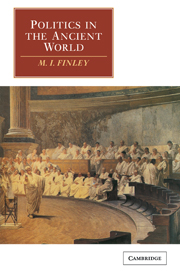2 - Authority and patronage
Published online by Cambridge University Press: 05 June 2012
Summary
Neither police action against individual miscreants nor crisis measures against large-scale ‘subversion’ tells us how a Greek city-state or Rome was normally able to enforce governmental decisions through the whole gamut from foreign policy to taxation and civil law, when they evidently lacked the means with which, in Laski's vigorous language, ‘to coerce the opponents of the government, to break their wills, to compel them to submission’. And we are considering states that were politically stable for centuries. Not all were, to be sure, but the critical fact is that the three we have to concentrate on because of the evidence, Athens, Sparta and Rome, were characterized by a continuous acceptance of their political institutions and of the men and classes who operated them. There were many political changes within our time-limits, many sharp political conflicts, many dissatisfied and disgruntled citizens, but the states remained politically stable. For Athens it is enough to recall the rapid reestablishment of the system after the shattering defeat in the Peloponnesian War and the two brief oligarchic coups that the war engendered; for Rome, sufficient proof is provided by the continued willingness of its citizens to serve en masse during centuries of unceasing warfare.
The unavoidable conclusion is that, at least in the stable states, acceptance of the institutions and of the system as a whole was existential: their legitimacy rested on their continual and successful existence.
- Type
- Chapter
- Information
- Politics in the Ancient World , pp. 24 - 49Publisher: Cambridge University PressPrint publication year: 1983

